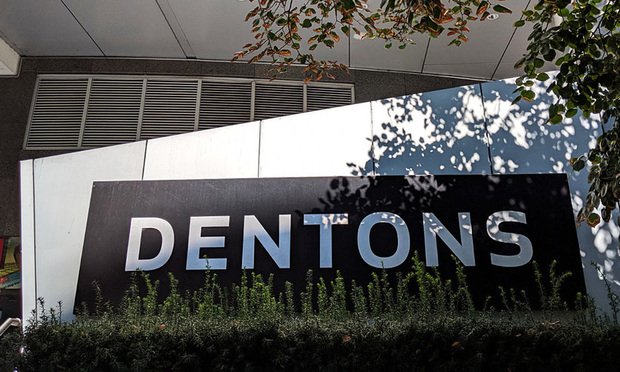Dentons' Leader Fires Back at Greenberg's 'Parochial and Condescending' Criticisms
Dentons' global chair Joe Andrew sharply rejects criticisms of its model by Greenberg Traurig's leadership, saying Dentons' competition is just afraid of a new model.
October 17, 2019 at 11:51 AM
6 minute read
 Dentons offices in Vancouver, British Columbia, Canada. (Photo: Mike Scarcella / ALM)
Dentons offices in Vancouver, British Columbia, Canada. (Photo: Mike Scarcella / ALM)
"Fooling around with alternative current is just a waste of time. Nobody will ever use it."
That is what Thomas Edison said in 1889 in response to the rise of the new electrical power delivery system that threatened the dominance of Edison's own direct current model. To discourage the adoption of alternating current, Edison even went so far as to demonstrate that dogs and cattle, which could survive a shock from direct current, would be electrocuted when they came into contact with alternating current. But when it came to what mattered most to customers, the ability to deliver electricity over long distances and to use it to power motors and generators, alternating current won out and became the foundation of America's power grid.
This tale is a good reminder that, when a new model for delivering service comes on the scene, a frequent response by those who benefit from the status quo, even if they are as brilliant as Thomas Edison, is to set up a straw man, or in this case a dog or a cow, to attack.
So I think readers of the recent comment on Dentons' plans to build the first truly national corporate law firm (Greenberg Traurig Chair Takes Aim at What Makes a Truly National Firm) will see that the author missed even the straw man he took aim at, let alone the reality. I agree with the goals in the guest opinion but note that there is no evidence that there is only one model to reach those goals, as is demonstrated by the success that so many different types of law firms have had around the world.
There are many positive attributes to a partnership structure, but every transactional lawyer knows that the choice of legal entity alone does not dictate how unified an organization is. There are disunified partnerships, unified corporate structures and everything in between. Law is a people profession, but people are different in different cultures and places. Because high-quality legal service demands an understanding of the cultural differences of solving a dispute or getting a deal done in different places, forcing "one culture" decreases the likelihood of high-quality client service. In fact, trying to do the "hard work" of making every office the same is like setting up a franchise where you want the hamburger to always be the same, rather than providing the best local cuisine that is appropriate for the place.
But because the best partnerships do have positive values that lead to high-quality work, Dentons has initiated the process of forming the first truly national firm in the United States using a one-firm, dual-partnership model that focuses on client service, not the internal politics of compensation systems and local leadership, which clients do not care about. Lawyers are able to protect and promote the culture of their firms while also becoming partners in a national partnership that incentivizes them to work collaboratively and has a single global conflict policy, national training and recruiting programs, one set of engagement terms, one know-your-client policy and one bill, all while partners share a commitment to quality and ethics that puts clients first. To imply anything else in Dentons' very transparent structure, described on our website, is to set up a straw man.
When you focus on whole firm combinations, you can do due diligence on a firm's culture, its ethics, its quality and how it makes decisions, all represented by the brand it has developed over decades. That is why Dentons co-brands, as many law firms do. For example, despite the author's protests, earlier this year Greenberg Traurig opened in Milan as Greenberg Traurig Santa Maria to capture the brand equity of a well-regarded law firm.
Even more ironic is to insist that you are a national law firm when it has taken 35 years to grow to 31 offices. Dentons takes its guidance from the clients we want to serve. As an example, the Russell 3000 are headquartered all across the country, with the vast majority outside of the 10 largest legal markets. Thirty-two of the 100 largest privately held companies are located in states that do not have even one of the 10 largest legal markets in them.
Clearly the footprint for what constitutes a truly national professional services firm should be the Big Four accounting firms, which serve nearly all of the corporate clients of the law firms that serve corporations. The smallest of the Big Four has offices in 79 locations in the United States. Compare that to the 31 offices of Greenberg Traurig, or the nine offices of Kirkland & Ellis, the largest law firm in the country by head count.
Can either of these firms be considered truly national if they do not have offices where the Big Four have offices serving their clients, including places that are in the top 20 markets for outside corporate legal spend, such as Detroit (the 10th largest legal market in the country), Seattle (13th), Charlotte (14th ), Omaha (16th), St. Louis (17th), Cincinnati (18th) or Cleveland (20th)?
The proposed combination with Bingham Greenebaum Doll and Cohen & Grigsby is Dentons' first step in forming that truly national law firm in the United States—and even that first step will serve 33 markets in the United States.
As all those who take first steps know, there is no one path to success. Some law firms succeed by serving a single market, others by serving a handful, a few by serving dozens. But those who attack a new model that will create a truly national law firm capable of serving many more of the most important legal markets in the United States are ignoring both the clients who need to be served in those markets and the significant number of talented lawyers who are already serving them. It is simply parochial and condescending to not understand that there are great lawyers, great clients and great law firms all over the United States. Our goal is to bring them together.
Joe Andrew is the global chairman of Dentons and is based in Washington, D.C.
NOT FOR REPRINT
© 2025 ALM Global, LLC, All Rights Reserved. Request academic re-use from www.copyright.com. All other uses, submit a request to [email protected]. For more information visit Asset & Logo Licensing.
You Might Like
View All
Paul Hastings, Recruiting From Davis Polk, Adds Capital Markets Attorney
3 minute read
Kirkland Is Entering a New Market. Will Its Rates Get a Warm Welcome?
5 minute read

Goodwin Procter Relocates to Renewable-Powered Office in San Francisco’s Financial District
Trending Stories
Who Got The Work
J. Brugh Lower of Gibbons has entered an appearance for industrial equipment supplier Devco Corporation in a pending trademark infringement lawsuit. The suit, accusing the defendant of selling knock-off Graco products, was filed Dec. 18 in New Jersey District Court by Rivkin Radler on behalf of Graco Inc. and Graco Minnesota. The case, assigned to U.S. District Judge Zahid N. Quraishi, is 3:24-cv-11294, Graco Inc. et al v. Devco Corporation.
Who Got The Work
Rebecca Maller-Stein and Kent A. Yalowitz of Arnold & Porter Kaye Scholer have entered their appearances for Hanaco Venture Capital and its executives, Lior Prosor and David Frankel, in a pending securities lawsuit. The action, filed on Dec. 24 in New York Southern District Court by Zell, Aron & Co. on behalf of Goldeneye Advisors, accuses the defendants of negligently and fraudulently managing the plaintiff's $1 million investment. The case, assigned to U.S. District Judge Vernon S. Broderick, is 1:24-cv-09918, Goldeneye Advisors, LLC v. Hanaco Venture Capital, Ltd. et al.
Who Got The Work
Attorneys from A&O Shearman has stepped in as defense counsel for Toronto-Dominion Bank and other defendants in a pending securities class action. The suit, filed Dec. 11 in New York Southern District Court by Bleichmar Fonti & Auld, accuses the defendants of concealing the bank's 'pervasive' deficiencies in regards to its compliance with the Bank Secrecy Act and the quality of its anti-money laundering controls. The case, assigned to U.S. District Judge Arun Subramanian, is 1:24-cv-09445, Gonzalez v. The Toronto-Dominion Bank et al.
Who Got The Work
Crown Castle International, a Pennsylvania company providing shared communications infrastructure, has turned to Luke D. Wolf of Gordon Rees Scully Mansukhani to fend off a pending breach-of-contract lawsuit. The court action, filed Nov. 25 in Michigan Eastern District Court by Hooper Hathaway PC on behalf of The Town Residences LLC, accuses Crown Castle of failing to transfer approximately $30,000 in utility payments from T-Mobile in breach of a roof-top lease and assignment agreement. The case, assigned to U.S. District Judge Susan K. Declercq, is 2:24-cv-13131, The Town Residences LLC v. T-Mobile US, Inc. et al.
Who Got The Work
Wilfred P. Coronato and Daniel M. Schwartz of McCarter & English have stepped in as defense counsel to Electrolux Home Products Inc. in a pending product liability lawsuit. The court action, filed Nov. 26 in New York Eastern District Court by Poulos Lopiccolo PC and Nagel Rice LLP on behalf of David Stern, alleges that the defendant's refrigerators’ drawers and shelving repeatedly break and fall apart within months after purchase. The case, assigned to U.S. District Judge Joan M. Azrack, is 2:24-cv-08204, Stern v. Electrolux Home Products, Inc.
Featured Firms
Law Offices of Gary Martin Hays & Associates, P.C.
(470) 294-1674
Law Offices of Mark E. Salomone
(857) 444-6468
Smith & Hassler
(713) 739-1250









